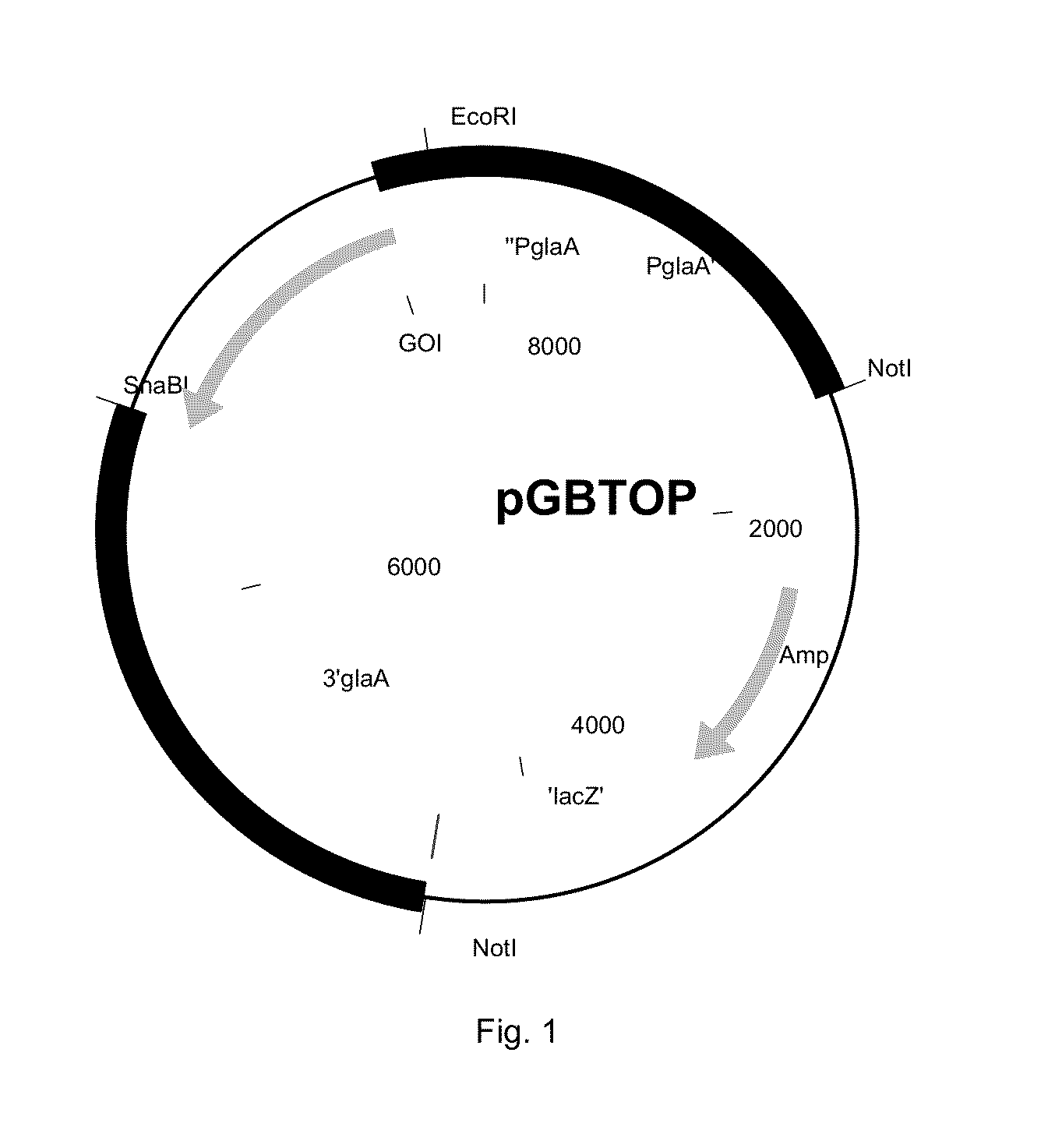Polypeptide having swollenin activity and uses thereof
a polypeptide and activity technology, applied in the field of sequences, can solve the problems of limiting the commercialization of biomass bioconversion processes, the energy potential of these carbohydrates is currently under-utilized, and the cost and hydrolytic efficiency of enzymes, so as to achieve swollen activity, swollen activity, and favorable properties
- Summary
- Abstract
- Description
- Claims
- Application Information
AI Technical Summary
Benefits of technology
Problems solved by technology
Method used
Image
Examples
example 1
1.1. Construction of Expression Plasmids
[0363]The sequence having SEQ ID NO: 1 was cloned into the pGBTOP vector (FIG. 1) using EcoRI and SnaBI sites, comprising the glucoamylase promoter and terminator sequence. The E. coli part was removed by NotI digestion prior to transformation of A. niger CBS 513.88.
1.2. Transformation of A. Niger
[0364]A. niger WT-1: This A. niger strain is CBS513.88 comprising deletions of the genes encoding glucoamylase (glaA), fungal amylase and acid amylase. A. niger WT 1 is constructed by using the “MARKER-GENE FREE” approach as described in EP 0 635 574 B1.
[0365]The expression constructs are co-transformed to strain A. niger WT-1 according to the method described by Tilburn, J. et al. (1983) Gene 26, 205-221 and Kelly, J. & Hynes, M. (1985) EMBO J., 4, 475-479 with the following modifications:[0366]Spores are germinated and cultivated for 16 hours at 30 degrees Celsius in a shake flask placed in a rotary shaker at 300 rpm in Aspergillus minimal medium (...
example 2
2.1 Preparation of Cellulase Samples
[0373]A cellulase enhancing protein, TEMER07589 (As described in co-pending patent application DSM Case 27666, filed on same day as this application) and two exoglucanases, being CBHI as described in patent application EP09158739.4 and CBHII (As described in co-pending patent application DSM Case 27829, filed on same day as this application), and a beta-glucosidase known from Murray et al., Protein expression and Purification, 2004, 38, 248-257, all from Talaromyces emersonii, were prepared as described in Example 1 for TEMER08806. Protein contents of these samples were determined and ranged from 20 to 60 mg protein as BSA equivalent / ml.
2.2 Cellulose Hydrolysis of Cellulase Mix with Swollenin Supplementation
[0374]The 4 cellulolytic proteins, being beta-glucosidase (BG), CBHI, CBHII and cellulase enhancing protein TEMER07589, were mixed at relative amounts of 9% of BG, 37% of TEMER07589, 30% of CBHI and 24% of CBHII, of the total protein in the mix...
PUM
| Property | Measurement | Unit |
|---|---|---|
| temperatures | aaaaa | aaaaa |
| temperatures | aaaaa | aaaaa |
| temperatures | aaaaa | aaaaa |
Abstract
Description
Claims
Application Information
 Login to View More
Login to View More - R&D
- Intellectual Property
- Life Sciences
- Materials
- Tech Scout
- Unparalleled Data Quality
- Higher Quality Content
- 60% Fewer Hallucinations
Browse by: Latest US Patents, China's latest patents, Technical Efficacy Thesaurus, Application Domain, Technology Topic, Popular Technical Reports.
© 2025 PatSnap. All rights reserved.Legal|Privacy policy|Modern Slavery Act Transparency Statement|Sitemap|About US| Contact US: help@patsnap.com

